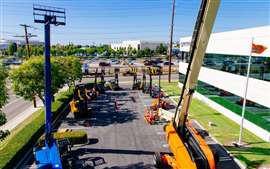Interview: BigRentz CEO Scott Cannon on the future of construction and rental
07 February 2024
BigRentz is making big news, announcing growth benchmarks and new partnerships that promise to improve the rental experience for both contractors and the rental companies that supply to them.
To find out what it all means to the future of construction and work in general, we spoke to Scott Cannon, CEO of BigRentz. What he has to say is exciting for all stakeholders.
RB: What’s new at BigRentz?
 BigRentz recently announced it has expanded its network of rental providers to 14,000 rental yards across the US
BigRentz recently announced it has expanded its network of rental providers to 14,000 rental yards across the US
Cannon: A lot has changed over the years since the company was originally founded in 2012. It used to cater to small contractors who couldn’t get the national pricing that the large rental houses did. We did a good job catering to those folks, and now we’ve built our network out to 14,000 rental yards across United States.
That’s over 6,000 rental companies in our network. That’s important because we can touch 90% of the US population within a 30-minute drive from these locations.
We have a reach that nobody can match, and that’s really good for our clients who are traveling contractors or large service companies that use technicians all across the United States. We’re uniquely qualified to support companies like that, and that’s where our shift as an organization has gone… catering to larger traveling contractors and service companies that do business throughout the United States.
RB: For those who might not know, how does BigRentz operate?
Cannon: We’ve prenegotiated rates with 6,000 rental companies across United States. We advertise online using SEO and paid advertising and use an algorithm to determine how to price across the United States.
We’re priced for the market, we’re not a discount shop. We don’t try to disrupt the space. We’re a partner to small rental companies, giving them a voice and a presence in front of customers they otherwise wouldn’t get.
We’ve spent a lot of time and money and effort to make sure that we show up on that first page of Google search. We’ve earned that spot through millions of dollars and years of development. And we provide that to our [rental] supplier team.
Customers can go online and pick a rental for a jobsite location anywhere across the United States. We use dynamic pricing, so it tends to fluctuate by the jobsite location, thet ype of equipment, and a variety of other factors. It’s a simple process, you check out online like you would when renting a car or any other type of rental.
 Scott Cannon, CEO of BigRentz
Scott Cannon, CEO of BigRentz
Customers don’t need to have 200 relationships across the United States. They can have just one, which has a uniformity of experience.
For rental companies, it’s a creative revenue, we don’t force our suppliers to do business with us. They can say no, and we track how often they say yes or no. We have some suppliers that have built their business around us, quite frankly.
We have one supplier in Southern California that we make up probably about 40% to 50% of his business. Last year we gave him probably 250 customers through our online platform, which administratively would have just been a burden for him. We provide that uniformity for the supplier as well; it’s a simpler experience for them.
RB: Speaking of the recent report about the 14,000 benchmark, what factors are behind that growth?
Cannon: We’re being driven by our customers’ needs. So as customers push us for additional availability of equipment in new locations, we’ve gone out to fill those needs. It’s just part of our process.
We did acquire a couple of companies three years ago, where we got several hundred locations at a time, but we have a dedicated team that goes out and looks for additional opportunities.
RB: Tell us about the new partnership with the finance provider, Billd.

Cannon: BigRentz and Billd both serve the same type of customer, primarily subcontractors. Subcontractors are unique in terms of how they run their business. They’re incredible business people.
There’s tremendous financial pressure put on subcontractors by the length of time it takes to get paid, and juggling from one job to the next. That has an impact in a downflow for companies like us, where we have subcontractors that have a hard time paying their bills, or don’t have the credit worthiness to extend terms.
We believe the relationship with Billd will offer another financial solution to customers that we jointly share. We’re here to support the same end customer. We bring a simplification of rental and value shop, and they bring financial solutions. Together we offer a pretty compelling partnership.
RB: What does all of this news say about the rental industry and the direction it’s going? What do you see in your crystal ball for the evolution of renting?
Cannon: Rental has been going digital for the last several years. I don’t think companies are going to a marketplace model more than they’re actually going to digitalization of the business to match the experience you would have in many other parts of your of your life or your work.
The partnership with Billd says we’re trying to offer more value and be more creative to get in front of our customers and offer more solutions in one location. In addition to Billd, we’re close to some new partnerships to help with staffing.
What are the big challenges on jobsites? You need to have the money to do the work. You need a piece of equipment, an operator, a technician or a tradesman, and materials. So long term, what I would see is the consolidation of those things into a platform to basically make it easier for contractors to do their job.
We’re in a relationship with a company that provides staffing on jobsites, and we’re working on a number of others that have tradesmen, or other subcontractors that do particular jobs, to expose them in our system to our customers, particularly where we share customers.
RB: What do you think is the most critical issue to construction and how is BigRentz part of the solution?
Cannon: The rental industry is in relatively good shape. Within the last couple of years, there’s been an issue with availability of equipment, because Covid really put a hammer on the supply chain. But there’s been pretty good growth over the last couple of years, and there are tailwinds. There’s a lot of government money and infrastructure projects that are going to roll out over the next several years, so rental penetration will continue to grow. In this day and age, it just makes sense not to own equipment.
But there are broader issues with staffing, and having appropriate tradesmen. There are a lot of folks retiring in the next 15 years, and there’s a gap where everybody was told to go to college and didn’t learn how to work trades. That’s really going to put a strain on our industry. And material costs have been a really big variable over the last couple of years.
We’re trying to be a solution for our companies. They need to get materials, they need to get equipment, and they need to get tradesmen. If you look at it together, I would say we’re looking to offer a bundle of jobsite services. That would be the direction of the company, long term.
RB: Data is a such big part of everything now, how does that fit into what you’re doing?
Cannon: We do 60,000 to 70,000 rentals per year, and we’ve been doing that now for close to eight years, consistently. As you can imagine, that provides us all kinds of information that we’re now starting to mine and use effectively, both to drive profitability, but also to be better partners to our supplier base, the rental companies.
Here’s a bit of a teaser... We spent the last two years and millions of dollars working on a new internal platform that we’re about to release in the next couple of months. After that, we see an opportunity to possibly release that same platform to end customers. It would be the world’s first procurement rental platform. Nobody’s ever designed anything like what we have. It’s early days, but yes, we are leveraging all the information we’ve accumulated to use it in a pretty interesting way.
RB: Anything else you’d like to add about BigRentz and the future of rental?
Cannon: We used to be seen as a potential disrupter, which has a negative connotation. I would say that’s 180 degrees from where we are today. We just did a survey of our top 300-400 suppliers across the United States. Almost uniformally, there was an openness to integration and figuring out how to work more effectively - -ven looking at their supply chain in terms of figuring out how they procure equipment, and seeing if there’s a way to do it on a more consolidated basis.
There are a lot of ideas today that just weren’t there five, six years ago, and I think part of it is just getting through Covid. Everybody’s lives got disrupted and it amplified the world’s desire to get whatever you want at the click of a button. I think people have gotten very comfortable with that in their lives, and this being a generational business, typically handed down from one generation to the next, I think that’s starting to evolve. We’re starting to have a lot of ownership go to the younger crowd and that’s pushing the openness to partnerships.
STAY CONNECTED



Receive the information you need when you need it through our world-leading magazines, newsletters and daily briefings.
CONNECT WITH THE TEAM








